 |
||||||||||
Spring 2009
Table of contents
|
 Dean James W. Curran Dean James W. CurranLast week we welcomed more than 250 prospective students and their guests to the RSPH, as part of Visit Emory. More than 90% of the students have been accepted to the RSPH, and I'm looking forward to seeing them again in late summer, when classes commence. The students had two full days of events, including meeting with faculty and touring the campus. This program is a big undertaking, and I thank the faculty and staff who donated their time to make the event a success. As these students saw last week, the RSPH is a large school. But it is the wonderful faculty, staff, and students that make RSPH feel like a "small town." As you read on in our recently revamped Dean's Letter, you'll see that another impressive public health researcher is joining our ranks.
del Rio named chair of global health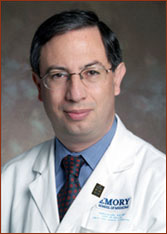 Carlos del Rio Please welcome Carlos del Rio, an internationally renowned infectious disease researcher, as chair of the Hubert Department of Global Health and Hubert Professor of Global Health. He joins RSPH as of April 1. As many of you well know, del Rio was a professor of medicine in the School of Medicine's division of infectious diseases and chief of medicine at Grady Memorial Hospital. He will retain a secondary appointment in the medical school. An expert on the impact of HIV in developing countries, del Rio has been at the forefront of Emory's leadership in international efforts to stem the AIDS pandemic. He is co-director of the Emory Center for AIDS Research, based in the RSPH. Under his direction, Emory is funded by the NIH as an AIDS International Training and Research Program, with international collaborations in Mexico, the Republic of Georgia, and Vietnam for training fellows in the United States and abroad. 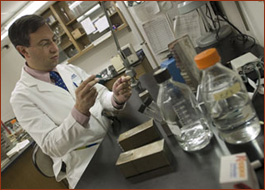 In addition, del Rio directs the World Health Organization's Collaborating Center on AIDS. He was recently nominated to the board of directors of the Global Fund to Control Malaria, Tuberculosis, and HIV/AIDS and is a leader in developing global initiatives to increase access to medications to control these three deadly diseases. A native of Mexico, del Rio received his medical degree from the Universidad La Salle in Mexico City, and completed his internship and residency at Emory. Upon returning to Mexico City, he became head of infectious diseases at the Hospital Angeles del Pedregal and associate professor of medicine at the Universidad La Salle. From 1992 until 1996, he was executive director of the national AIDS Council of Mexico. Today del Rio is a leading collaborator with Mexico's National Institute for Public Health in Cuernavaca, a partner institution with the RSPH.  Rey Martorell I want to thank Rey Martorell for his 10 years of service as chair of global health. During his tenure, the department significantly expanded the size of its faculty and student body as well as its research base and academic programs. Martorell is stepping down as chair to devote more time to his research as Robert W. Woodruff Chair of International Nutrition and to continue working with Jeff Koplan of the Emory Global Health Institute to support the International Association of National Public Health Institutes. Thus he will continue to broaden understanding of the causes and consequences of malnutrition in pregnancy and early childhood and use this information to influence policy-makers to design effective health programs.
Construction on the Claudia Nance Rollins Building is well under way. Dean Surbey, associate dean for administration and finance, reports that we are on schedule and that the building will "top out" in July, when we will celebrate that the building has reached its maximum height.  Dean Curran During the planning stages, Surbey met with a number of faculty, staff, and students to get a better idea of how they see the new building. You expressed a desire for a warm and welcoming building that reflects public health and its global nature. You wanted more flexible space and less "tailored" space, areas that are student-focused, and areas that encourage interaction among faculty members. The building will be certified LEED Silver (Leadership in Energy & Environmental Design) by the U.S. Green Building Council and will be outfitted with dual flush toilets to conserve water. A big emphasis has been placed on natural light streaming into every floor. There will be more instructional space, including a 250-seat auditorium. Event space will be available on the top floor of the building, along with two terraces. Architectural plans for the renovation of the bottom three floors of the Grace Crum Rollins Building are under way. These plans include a new caf on the plaza level with indoor and outdoor seating. A life-size office mock-up was installed on the lower level of the Grace Crum Rollins Building to get faculty and staff feedback. It is outfitted with a glass sliding door that will be used on faculty and staff offices, along with a "window" that runs the height of the office.
Nutrition expert Glen Maberly retires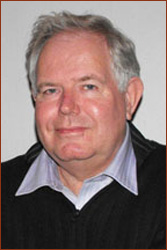 Glen Maberly Glen MaberlyThe RSPH now has permanent ties to the land down under, courtesy of Glen Maberly, founder of the Flour Fortification Initiative (FFI) in the RSPH. Maberly retired in January to return to his native Australia to establish the Center for Health Innovation and Partnership with the Sydney West Area Health Service. An endocrinologist by training, Maberly joined the RSPH in 1990 to help create and co-direct the Program Against Micronutrient Malnutrition, helping reduce birth defects through increased use of iodine in salt. In 2004, Maberly established the FFI as a public/private effort to make vitamin and mineral fortification of wheat flour a standard milling practice worldwide. Since then, the number of countries with national standards for flour fortification has increased from 33 to 56. Maberly was founding chair of the Department of International Health, now the Hubert Department of Global Health, in 1992 and served until 1997. He also helped recruit international nutrition expert Rey Martorell to the RSPH. "I am the beneficiary of all that Glen has brought to the department and the school," said Martorell during the retirement celebration for Maberly. FFI member Bill Dietz credited Maberly with improving nutrition for millions of people in partnership with the flour milling industry. "We've been the beneficiaries of your good work and your students," said Dietz, director of physical activity and nutrition at the CDC. In his new role, Maberly will help create a center serving one-eighth of Australia's population. "Life is transient and things change," said Maberly. "Now you have a satellite in Sydney."
Rollins-teers honored for community service Rollins-teer
Day 2008 Rollins-teer
Day 2008 The 365 RSPH students who took part in Rollins-teer Day last August did more than serve the Atlanta community. They helped Emory achieve the 2008 Presidential Award for General Community Service--the highest federal recognition a college or university can receive for volunteerism, service learning, and civic engagement. Emory is one of only three colleges and universities to earn this annual distinction from the Corporation for National and Community Service.The award also earned Emory a place on the 2008 President's Higher Education Community Service Honor Roll, recognizing U.S. colleges and universities for innovative and effective community-service and service-learning programs. In March, U.S. Congressman John Lewis cited Emory and the honor roll in the Congressional Record. Kara Brown Robinson, assistant dean for student affairs/admissions, and Kristin Unzicker, Rollins-teer program coordinator and assistant director of international affairs/special programs, joined other Emory representatives for the award ceremony at the American Council on Education Annual Conference in Washington, D.C., in February. Both serve as liaisons to Emory's Office of University-Community Partnerships, charged with creating a continuum of engaged scholarship and service for all students. During 2008, Emory students completed nearly 150,000 hours of service with more than 200 community partners. As part of that effort, our Rollins-teers contributed 1,460 services hours by preparing 2,772 meals for people living with HIV/AIDS, repairing four senior citizens' homes, packing dozens of boxes with medical supplies for shipment to clinics overseas, cleaning up streams, and more. Established in 2007, Rollins-teer Day proved so successful that it evolved into the Rollins-teer Service Learning Program so that RSPH students can provide community service throughout the academic year.
Marcus leads epidemiology as acting chairMichele Marcus has stepped in as acting chair of the Department of Epidemiology. Prior to joining the RSPH in 1992, she served as director of the Environmental Epidemiology Core of the NIEHS Environmental Health Sciences Center at Mount Sinai School of Medicine. Her current research interests encompass environmental and reproductive epidemiology and neuroepidemiology. She also serves as director of graduate studies for the department. I would like to thank John McGowan, who served as acting chair from August 2008 to January 2009, and who provided valuable leadership to the department as the search continues for a permanent chair.
Cutting tobacco use in China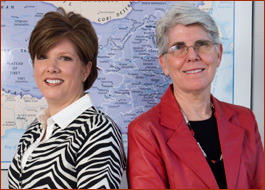 Pam Redmon and Kathy Miner Pam Redmon and Kathy Miner Smoking is rampant in China. There are more smokers there than people living in the United States, according to WHO, and an estimated 3,000 Chinese die every day due to smoking. RSPH's Tobacco Technical Assistance Consortium (TTAC) and the Emory Global Health Institute (GHI) are now working in China to reduce those numbers, supported by a $14 million grant from the Bill & Melinda Gates Foundation. "Smoking is a new area for the Gates Foundation," says Jeffrey Koplan, Emory vice president for global health, GHI director, and principal investigator of the grant. "The foundation has largely focused on infectious diseases and maternal and child health issues. So this is a big jump." The China project builds on TTAC's success in providing tobacco control assistance and training throughout the United States and its territories. Working in China is a global first for TTAC, led by Kathy Miner, who serves as its principal investigator, and Pam Redmon, executive director. Miner and Michael Erickson, an expert in national and global tobacco control efforts and director of the Institute of Public Health at Georgia State University, serve as co-principal investigators on the Gates grant. In February, work began on the ground in China
when Koplan, Redmon, and Erickson met with public health officials
to discuss launching the first tobacco control initiatives, developing
a high-level tobacco-control advisory committee, and creating a tobacco-control
center of excellence, possibly at a university. "We plan to start
small, targeting four to six cities and tailoring strategies to fit
each site's circumstances," says Redmon. "Then we'll see
what practices look promising and fund more cities during the remaining
years of the grant."
Factoring the environment into Parkinson's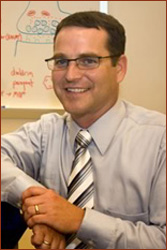 Gary Miller Gary MillerGary Miller now leads a multidisciplinary center to study environmental factors related to Parkinson's disease. The Emory Parkinson's Disease Collaborative Environmental Research Center (Emory PD-CERC), funded by a five-year, $6.4 million grant from NIH, involves researchers from Emory and Georgia Tech to determine how the environment influences the disease. The PD-CERC encompasses three major research areas: determining the environmental contaminants that can interrupt storage of the neurotransmitter dopamine, determining how mitochondria respond to injury, and developing metabolic biomarkers to detect exposures and the disease itself. Miller's research team recently established novel behavioral methods to assess motor impairment in mouse models of Parkinson's disease. Prior to this finding, his team found a connection in lab mice between exposure to the banned pesticide dieldrin during gestation and lactation and an increased risk of developing Parkinson's.
RSPH expands study of emergency preparedness Ruth Berkelman Ruth BerkelmanAnother new RSPH center has been launched, this time with a $1.5 million grant from the CDC. The Preparedness and Emergency Response Research Center (PERRC), led by Ruth Berkelman (Epidemiology), Rollins Professor of Public Health Preparedness and Research, will help identify factors that affect a community's ability to successfully respond to a crisis. "The Emory PERRC is important in linking academic expertise from across our university with the needs of state and local health agencies," says Berkelman, who also directs the Emory Center for Public Health Preparedness and Research. "The government has made major investments in public health to increase our preparedness for public health crises, and we need to know what works and what doesn't." The RSPH is one of seven public health schools included in the $10.9 million grant from the CDC to establish PERRCs. Other schools include Johns Hopkins, Harvard, and the University of North Carolina.
New nursing dean has ties to public health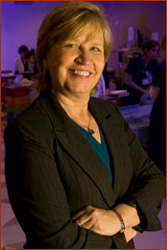 Linda McCauley Linda McCauleyThe RSPH will gain a public health partner when Linda McCauley joins Emory in May as dean of the Nell Hodgson Woodruff School of Nursing. She also will hold a faculty appointment in the RSPH and thus strengthen the collaborative ties between our schools. Her appointment is the culmination of a national search chaired by Emory Healthcare Chief Nursing Officer Susan Grant and myself. McCauley comes to Emory from the University of Pennsylvania School of Nursing. She is a national leader in the research of environmental exposures and studies of pesticide exposures among minority communities. Her work aims to identify culturally appropriate interventions to decrease the impact of environmental and occupational health hazards in vulnerable populations, including workers and young children.
KudosDuBois Bowman (Biostatistics) was honored by the Atlanta Hawks at one of the basketball team's home games during Black History Month. Bowman was recognized for his work as director of the Center for Biomedical Imaging Statistics in the RSPH. Kristin Dunkle (Behavioral Sciences and Health Education) received the 2008 Albert E. Levy Award for her study of heterosexual transmission of HIV in Africa. The award from Emory's University Research Committee recognizes achievement in science. Stan Foster (Global Health) was honored for championing the role of nongovernmental organizations (NGOs) in child survival efforts. Foster received the Dory Storms Child Survival Recognition Award from the CORE Group, a coalition of NGOs based in Washington, D.C. The annual award honors an individual for effective NGO program implementation leading to improved health of mothers and children in developing countries. Javier Guiterrez 09MPH and Shauna Mettee 09MPH/MSN were among six recipients of this year's Emory University Humanitarian Award, honoring students for serving others. Guiterrez is a physician who founded a clinic with his wife in the Colombian jungle to serve residents with little access to health care. Mettee expanded the scope of Emory's Student Outreach Response Team by expanding hands-on learning and skills training through partnerships with the CDC and the American Red Cross. The film series "Unnatural Causes: Is Inequality Making Us Sick?" was recognized with the Alfred I. DuPont-Columbia Award in broadcast journalism. The four-hour series aired on PBS last spring to examine the root causes of socio-economic and racial inequalities in health. One of the episodes, "When the Bough Breaks," featured Carol Hogue, the Jules and Uldeen Terry Professor of Maternal and Child Health, and Fleda Jackson (Epidemiology). James Hughes (Medicine/Global Health) was elected vice president of the Infectious Diseases Society of America. Hughes serves as executive director of the Southeastern Center for Emerging Biologic Threats, director of the Emory Program in Global Infectious Diseases, senior adviser with the Emory Center for Global Safe Water, and senior scientific adviser for infectious diseases with the International Association of National Public Health Institutes. Megan Ivankovich 09MPH is one of seven Emory women--and the only student--named Unsung Heroines for 2009. As co-president of the Emory Reproductive Health Association (ERHA), Megan brought a number of organizations together, on and off campus, to work collaboratively with the ERHA, which is based in the RSPH. Juan Leon (Global Health) received the Outstanding Achievement by an Early Career Stage Life Scientist Award from the Federation of American Societies for Experimental Biology and the National Institute for General Medical Sciences. He is an assistant professor. His area of research focuses on the immune response of individuals and populations to parasitic and enteric viral pathogens, especially those involved in foodborne and waterborne disease. Jennifer King, a second-year MPH student in epidemiology, was named Student Leader of the Month for February by Emory's Office of Student Leadership and Service. The award honors students who go above and beyond the call of duty to make Emory a vibrant community. King is one of the founding members of the Response, Preparedness, and Emergency Communication Team for RSPH students. Michelle Marcus, Ruth Berkelman, Venkat Narayan, Carrie Drews-Botsch, Paige Tolbert, Gary Miller, and colleagues received a 2009 Institutional Program Unifying Population and Laboratory Based Sciences Award from Burroughs Wellcome. The $2.5 million award supports the Human Health: Molecules to Mankind Doctoral Training Program. Emory was one of three institutions to receive funding. Ken Brigham associate vice president and director of the Emory/Georgia Tech Predictive Health Institute, is the principal investigator. Venkat Narayan (Global Health) and his research team received the Outstanding 2008 Paper Award from the American Public Health Association Vision Care Section last fall. Their article "Eye Care in the United States: Do We Deliver to High-Risk People Who Most Benefit From It?" appeared in the March 2008 issue of Archives of Ophthalmology. The team analyzed data from the 2002 National Health Interview Survey and found substantial inequity in access to eye care. Godfrey Oakley (Epidemiology) will lead the American Epidemiological Society as president beginning in March 2009. Anne Spaulding (Epidemiology) received the Armond Start Award of Excellence from the Society of Correctional Physicians. The award honors one of the society's founding members, Armond H. Start, who represented the highest of ideals in correctional medicine. Please join me in congratulating these outstanding students and faculty.
|
|||||||||
|
||||||||||
| ||||||||||
 |
||||||||||
